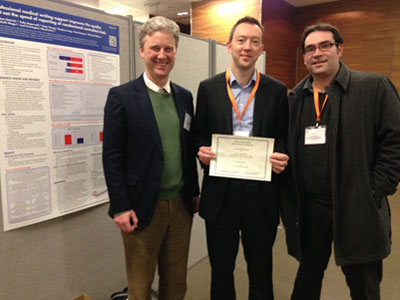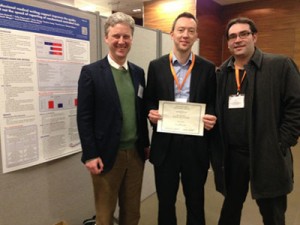Professional medical writing strengthens research reporting, shows Oxford PharmaGenesis
Posted: 27 April 2015 |
Professional medical writing improves the quality of clinical trial reporting, demonstrates a study presented at the 11th Annual Meeting of the ISMPP…


Chris Winchester, Will Gattrell and Paul Farrow with the prize-winning poster at the 2015 European Meeting of ISMPP
Professional medical writing improves the quality of clinical trial reporting, demonstrates a study presented at the 11th Annual Meeting of the International Society of Medical Publication Professionals (ISMPP).


Chris Winchester, Will Gattrell and Paul Farrow with the prize-winning poster at the 2015 European Meeting of ISMPP
The award-winning research shows that the number of pieces of important information disclosed in medical journal articles almost doubles when medical writers are involved in writing up the trials.
“We all know from experience that medical writers include important information that can otherwise be missed,” comments Dr Chris Winchester, Managing Director of Oxford PharmaGenesis, who was involved in the research, “But our research demonstrates this convincingly for the first time.”
The study used the widely valued CONSORT checklist to assess the quality of reporting of randomised controlled trials. Articles with medical writing support were nearly twice as likely to report at least 50% of CONSORT items completely as articles without writing support (39.1% vs 21.1% of articles), and this difference was statistically significant (p < 0.05).
Nearly twice as many articles with medical writing support had acceptable written English (rated by peer reviewers) as those without such support (79.6% vs 42.9%; p < 0.01). Interestingly, this improvement may come at the cost of a small delay – the median time from submission to acceptance was slightly longer for articles with medical writing support than for those without support (167 vs 136 days; p < 0.01).
Commercial Director of Oxford PharmaGenesis and a co-author, Dr Richard White, says, “This is the first convincing evidence of the value of professional medical writing support in improving the quality of reporting of clinical trials. We hope that other medical communications professionals will also be bold and conduct their own studies to investigate our profession’s contribution to evidence-based medicine.” Co-author Liz Wager, who was lead author of the first Good Publication Practice guidelines, adds, “This study demonstrates the professionalism of medical writers. It confirms that they really are experts in reporting research and that their contribution can raise the quality of reporting.”
Industry-funded articles supported by professional medical writing were more than twice as likely to report at least 50% CONSORT items completely
The study was awarded the ‘Best in Original Research’ prize, when it was presented at the European Meeting of ISMPP in January 2015. A recent update to the research shows that the benefit of medical writing support is independent of funding source. In fact, industry-funded articles supported by medical writers were more than twice as likely as industry-funded articles without writing support to report at least 50% of CONSORT items completely (38.0% vs 17.9%, p < 0.05). Conversely, for articles with no medical writer involvement, funding source had no significant effect on the quality of reporting.
The research is now being prepared for full publication in a peer-reviewed journal to demonstrate the value of professional medical writing to an even wider audience.




